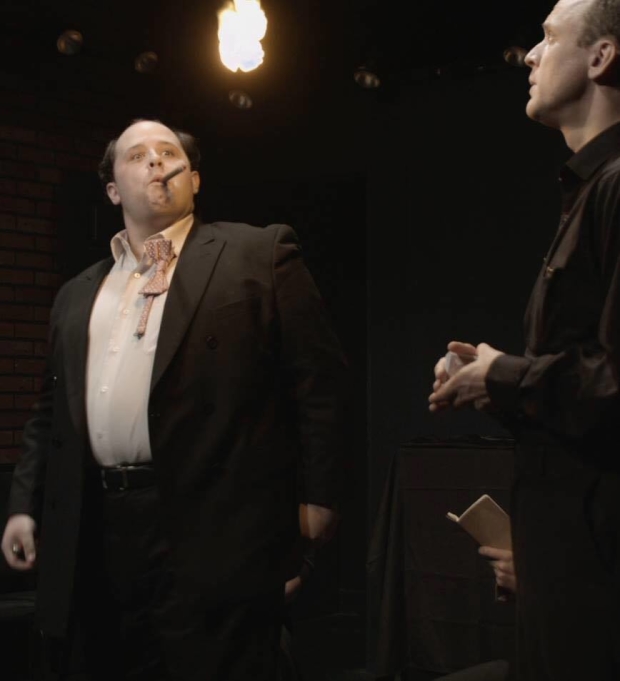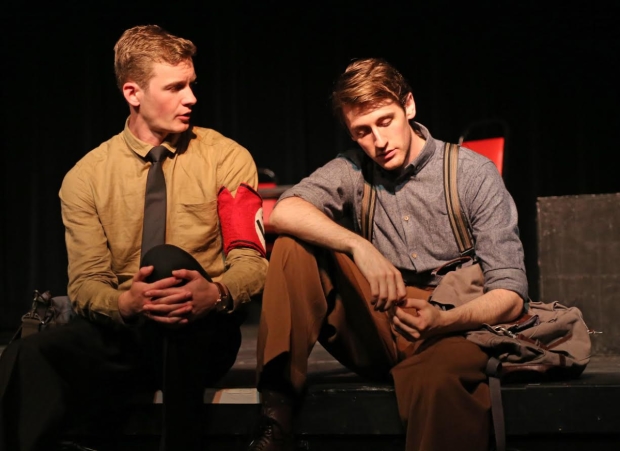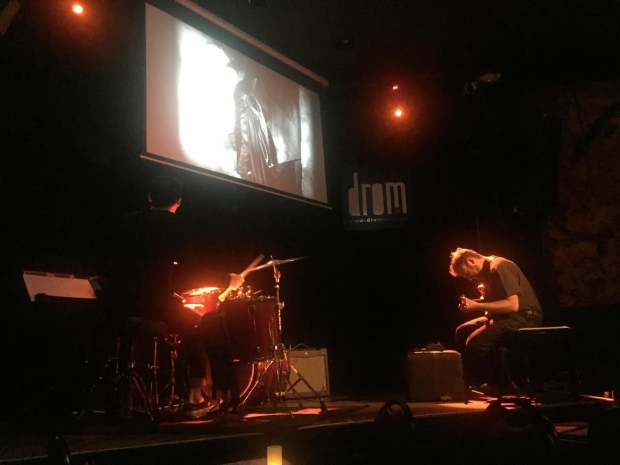FringeNYC 2016: Dementia Americana; The Radicalization of Rolfe; At the Crossroads

(© Synapse Theatre Ensemble)
It was one of the country's first major media frenzies. In June 1906, the eccentric millionaire Harry K. Thaw gunned down the prominent architect Stanford White on the rooftop of Madison Square Garden. The idea that Thaw, widely believed to be mentally unstable, did it to avenge the honor of his former chorus-girl bride, White's old flame Evelyn Nesbit, made the subsequent murder trial even more of a circus.
While the events have largely been forgotten, seasoned theatergoers will most likely recognize the saga from having been immortalized within the first 20 minutes of the musical Ragtime. That hasn't stopped the writers Louis Aquiler and Chris D'Amato from putting their own spin on the story, though, and the result is the zany and thoroughly engaging Dementia Americana at Teatro Latea.
Focusing mostly on Thaw (played with gusto by D'Amato) and his proclivities (sex and drugs), Dementia Americana is told from the perspective of Dr. Rollo May (David Shaw, dignified amid the madness), a fictional psychologist who takes us through the major events of Thaw's life leading up to the murder and the subsequent trial.
Thaw, we come to learn, is exhaustively insane, a victim of living the best lifestyle that money can buy when no isn't an answer. His deep obsession with Evelyn (the palpably conflicted Kari Buckley) leads to his sweeping her around the world, marrying her, and vowing revenge on White (Kenneth Robert Marlo) for defiling her years earlier. When he murders White, his team pleads "dementia Americana," an alleged form of insanity that leads to violence when someone believes their family has been taken advantage of.
While it gets a little long near the end (the scenes set during Thaw's trial could have been shortened), director Paul Mancini keeps the energy high and the performances focused straight through the unsettling Brechtian final moments. Aquiler and D'Amato's script effectively delivers the historical facts while making them dramatic, giving a contemporary spin to the period lingo, which could have bogged the show down. History may have forgotten this minor cultural moment, but in Aquiler and D'Amato's hands, the story is especially timely. If the world's ongoing fascination with celebrity justice, and the popularity of shows like The People v. O.J. Simpson, is any indication, it will always be strikingly relevant.

(© Dixie Sheridan)
The hills are alive in Andrew Bergh's The Radicalization of Rolfe, but the sound of music isn't anywhere to be heard in this darkly funny new drama, a riff on the classic Rodgers and Hammerstein musical told from the perspective of one of its most famous ancillary characters.
Wisely resisting the urge to parody this Golden Age classic, Bergh explores the coming of age of Rolfe (Logan Sutherland), the 17-going-on-18 messenger boy who, onstage and on-screen, takes a liking to the eldest Von Trapp daughter. But Bergh sees Rolfe's motives as a little more sinister than the innocent impulses of puppy love, imagining the young man as a spy for the Nazi Gauleiter Herr Zeller (Dominic Comperatore).
Tasked with collecting information on the Von Trapps and their new governess, Rolfe must also contend with his bourgeoning sexual relationship with Johan Schmidt (Alex J. Gould), the gay nephew of Von Trapp housekeeper Frau Schmidt (Polly Adams). Hot on their heels is Franz (Jay Patterson), the Von Trapp's supposedly loyal butler, who happens to be jealous of Rolfe's quick ascent through the ranks of the Third Reich.
Set during the film and musical's scene changes, The Radicalization of Rolfe (mysteriously spelled with an extra "e") is an intriguing look at what might have been if the original property had gone darker. In Abigail Zealey Bess' well-honed production, there are a lot of great belly laughs, owing mostly to the release of backstory (the Von Trapp children wearing clothing made of drapes, for example). But it's not afraid to go deeper, and Sutherland beautifully plays his character's inner conflict, especially in the wrenching last scene. The Von Trapps might make it over the mountain, but Rolfe learns the hard way that Liesl isn't the only one who's totally unprepared to face a world of men.

(© Emily Gardiner Hall)
At the Crossroads: Music for Faust
In 1926, the expressionist director F.R. Murnau released his version of Goethe's Faust. Owing to elaborate special effects and the use of multiple cameras for various angles, it became the most expensive movie to date. Costing 2 million marks, it earned back only half its budget, becoming a major flop.
Yet, as many flops do, they retain some historical interest, and Faust became a minor sensation in the annals of cinema, primarily for its mise-en-scène. It also upped the ante in terms of special-effects techniques — perhaps the most memorable of which is the image of the devil Mephisto enveloping a whole town.
Now audiences can get a fresh look at Faust. Ben Singer, the founder of Modern Robot, a company that screens classic movies with live musical accompaniment, has composed the score for At the Crossroads: Music for Faust, a 50-minute cut of the film backed up by Singer on guitar and Spencer Cohen on drums.
Rather than play the original score (written by the prolific and uncredited William Axt), this version features a whole new catalogue of contemporary indie rock tunes penned by Singer. The result is a largely mesmerizing experience, one that gives audience members a new appreciation for the power of music and its ability to set a mood. Cohen's driving drums and Singer's slide guitar match the bold visuals of the film as the music lurks ominously under the already haunting imagery.
Evoking the orchestral concerts of Lord of the Rings and Harry Potter, perhaps At the Crossroads: Music for Faust isn't the best entry for a primarily theater-driven festival. But it is its own kind of stage art, one geared toward cinephiles, for whom this is an ideal way to experience a little-known classic.











